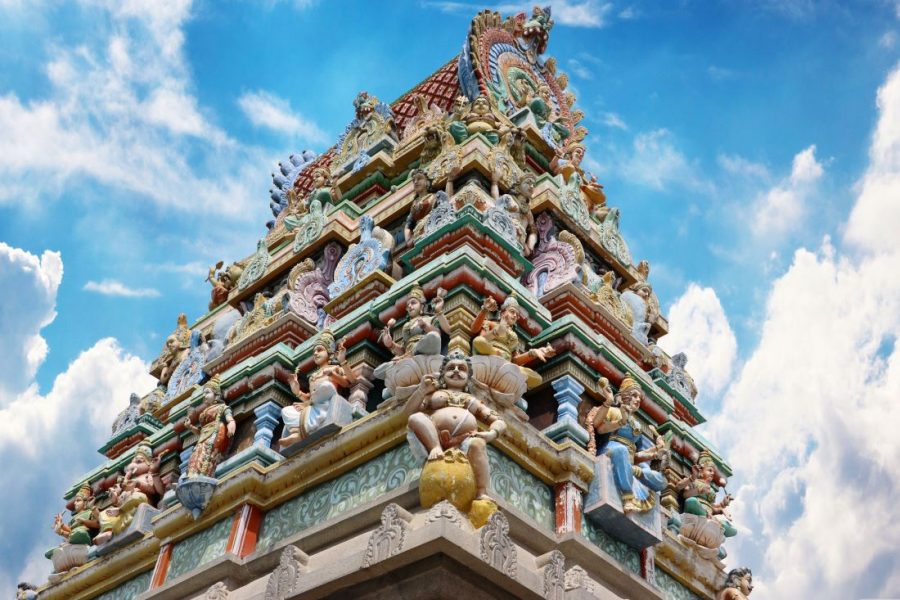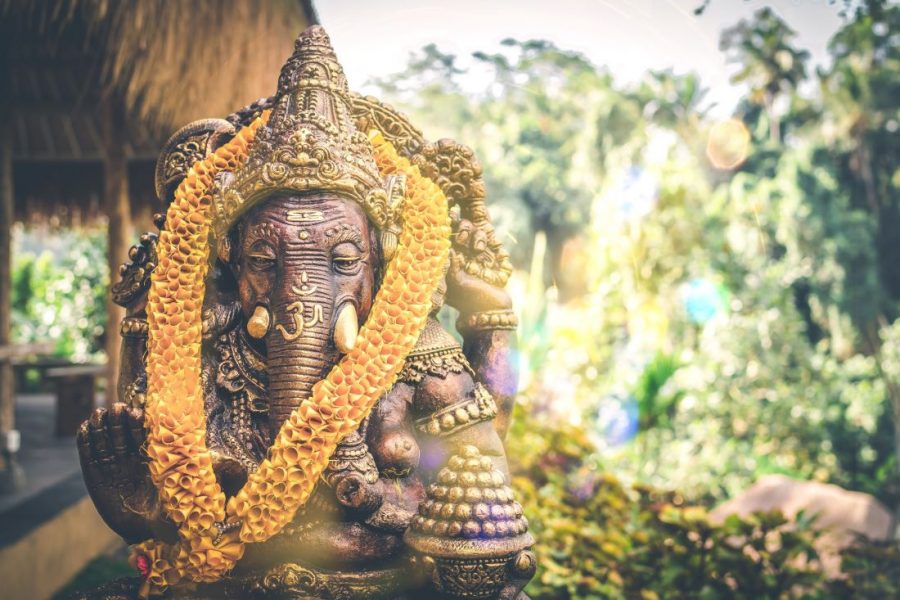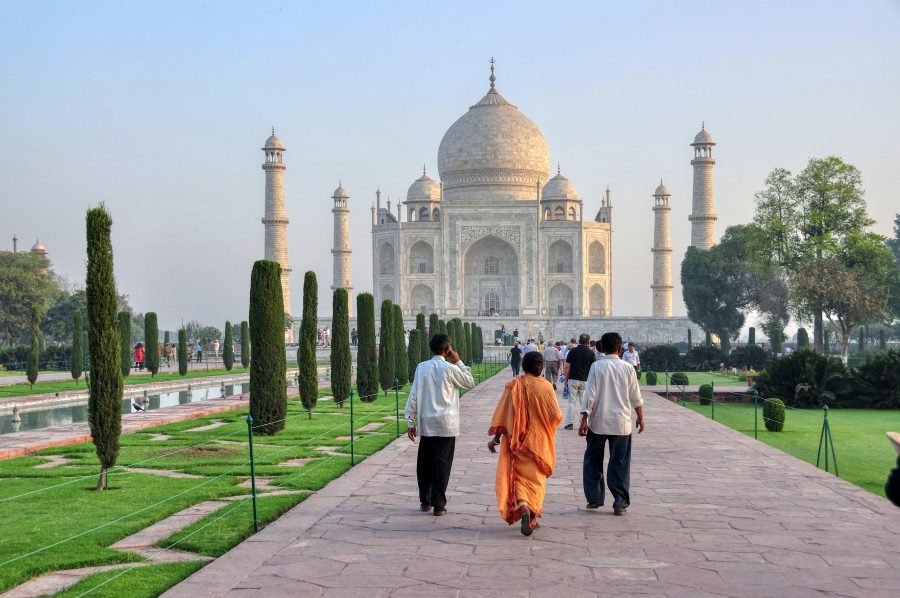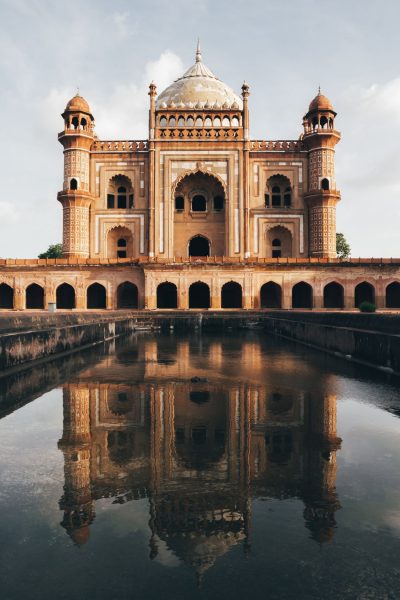Did you know that India has 22 official languages? According to a census from 2018, there are 19,500 languages or dialects spoken in India as mother tongues! Therefore, when you’re speaking Hindi travelling around India, be wary of the fact that not everyone will be familiar with it.
However, Hindi is spoken by the government, in many major cities, and predominantly in Bollywood films. So it’s the most popular language spoken in India and gives you a better chance to bridge the communication gap.
Although India is the second-largest English speaking country in the world, it’s not spoken so much in rural areas and it’s always nice to have a few handy Hindi words and phrases up your sleeve!
Even though I was born in England, I am very lucky that my family brought me up in a Hindi speaking household. I was able to learn and develop my speaking skills, then practice a ton on our family holidays to India!

Some Quick Tips for Learning Hindi for Travel
Something to bear in mind when speaking Hindi is that the alphabet is made up of sounds rather than letters, for example, aa, ah, am.
When/if you’re struggling with the pronunciation of a word, then simply Google the spelling. Hindi words are spelt exactly how they are pronounced so this is generally the best and easiest way to learn. But, I will try my best to break the words up below so you can start mastering these Hindi phrases before you travel!
There are also different levels of formality that are harder to translate. Depending on who you may be speaking to, there are different ways of saying the same thing!
So, without further ado, here are some handy, common phrases in Hindi you might need to use whilst travelling in India!
Hindi Greetings to Get Started
1. Hello: Namaste “Na-MAH-stay”
The first word to know in any language is hello! Namaste is pretty well known and used across the world due to its link with yoga and spirituality.
But as a side note, just in case you haven’t come across this word before, it also comes with a gesture. Namaste derives from Sanskrit and literally translates to ‘I bow to you’ so you would usually bow your head a little and put your hands together in greeting. Along with saying hello it’s a sign of respect towards the person you have just met.
Namaste is quite often said in the place of good morning, good evening and goodbye!

2. How are you?: Aap kaise ho? “Ahp KAY-say ho”
This is a very formal and polite way of saying ‘how are you?’ and is best used when speaking to people older than you or to someone you may not know.
An informal way of saying the same thing is: kya haal hai? “Key-ya haal hay” to use with friends.
3. I’m good!: Main theek hoon! “meh TEA-K who”
4. Goodbye: Alvida “al-VEE-da”
What I have noticed when people are saying goodbye is that they tend to say “okay, I’m off now: aacha fir chalte hai” or even namaste again! Alvida isn’t very commonly used because it’s more formal.
5. Yes: Haan “haa” (respectful – haanji)
Adding ‘ji’ adds a layer of respect to a word or sentence, though it doesn’t work with every word.
6. No: naahi “NA-he”

Some More Basic Phrases in Hindi
7. What is your name?: Aap-kaa naam kya hai “Ahp ka naa-M key-ya hair” (formal) Tum-hara naam kya hai “Thum are-ra naa-M key-ya hair” (informal)
8. My name is…: Mera naam (insert name here) hai. “Meh-RA naa-M … hair”
9. Thank you: Shukriya or dhanyavaad “shook-re-a” or “DHan-ya-vaad”
There are two ways of saying thank you! Dhanyavaad is definitely harder to pronounce so here are some tips: really enunciate the “dh” and when there’s a double letter like in ‘vaad’ stretch the word out a bit. Add a “bahut: baa-hot” to the beginning and you have a thank you very much!
10. Please: Kripa “Cryp-ya”
An important note when speaking Hindi: Please is used at the beginning of a sentence!
11. Sorry: Maaf kijiye “Maa-F key-GEE-yay”
12. Excuse me/Give way: Zara raaste dena “Zara raas-tay day-na”
The streets in India are always jam-packed so you’ll be using this phrase often, especially when navigating your way through street markets.
13. Let’s go!: Chaloo! “Chal-LOW”
Friend: Dost “doe-st” For example, chaloo dost: let’s go, friend! A friendly, informal, carefree word to use with all the new friends you’ll make.
Hindi Phrases for Travelers to Learn

14. Do you speak English?: Kya aap angrezee bolate hain? “Key-ya ahp an-GREY-zee ball-tay hair”
Always handy to know, as we’ve mentioned many people in urban areas of India can speak English very well, while many others know keywords to help you communicate better with them.
15. Where is the metro station?: Metro station kidhar hai? “Metro station kid-the-R hair”
16. I need a taxi/auto/rickshaw: Mujhe ek taxi chahiye “Muj-hay ae-K taxi che-yeh”
17. Can you help me?: Kya aap meri madad kar sakte ho? “Key-ya ahp meh-RI mad-at k-RR sack-tay ho”
18. I am looking for…: Mujhe (insert what you are looking for) ki talaash hai “Muj-hay … key tal-ash hair”
Talking About Food in Hindi
19. I have an allergy: Mujhe allergy hai “Muj-hay allergy hair”
For example, I have a peanut allergy: Mujhe moongphalee “moo-fa-lee” ki allergy hai.
There is no translation for allergy, unfortunately, but I have found that people tend to understand the word especially when you expand on the type of allergy you have.
Clarifying that you have allergies is important, especially when eating at stalls on the street. It’s really popular in India and often the fastest and yummiest way to eat!
20. I am vegetarian: Main saakaahaarii huun “Meh saa-KAA-HAA-ri who”
21. I don’t eat spicy food: Mujhe kam mirch chaiye “Muj-hay come mir-ch chAE-yay”
If Indian food is known for anything, it’s the explosive flavour and spice. But, if you’re not used to it, then it can be overwhelming. Don’t worry, people don’t mind at all adjusting the spice levels to your comfort.
22. Could I have a bottle of water: Mujhe ek paani ki bottle chahiye “Muj-hay aa-K paa-knee key bottle chAE-yay”
Let me tell you: sealed bottled water is essential while travelling in India! Especially if you’re not used to the water or travelling in rural areas, it can be a lifesaver. It’s also very hot and you’re going to have to stay hydrated.
23. How much is this?: Ye kitana ka hai? “Yay kit-nay ka hai”
Another common phrase to keep in mind, since you’ll be buying and paying for things everywhere you go. It’s important to try to communicate and get clear answers quickly. Not everything is priced and people love to bargain in India!
I hope these words and phrases will help you on your travels around India. Don’t be afraid to jump in, try authentic food from stalls, and visit the markets. Get off the typical tourist track and immerse yourself into the culture that will surround you as soon as you step foot in India.































